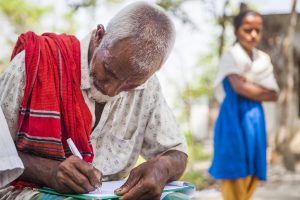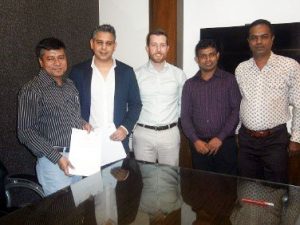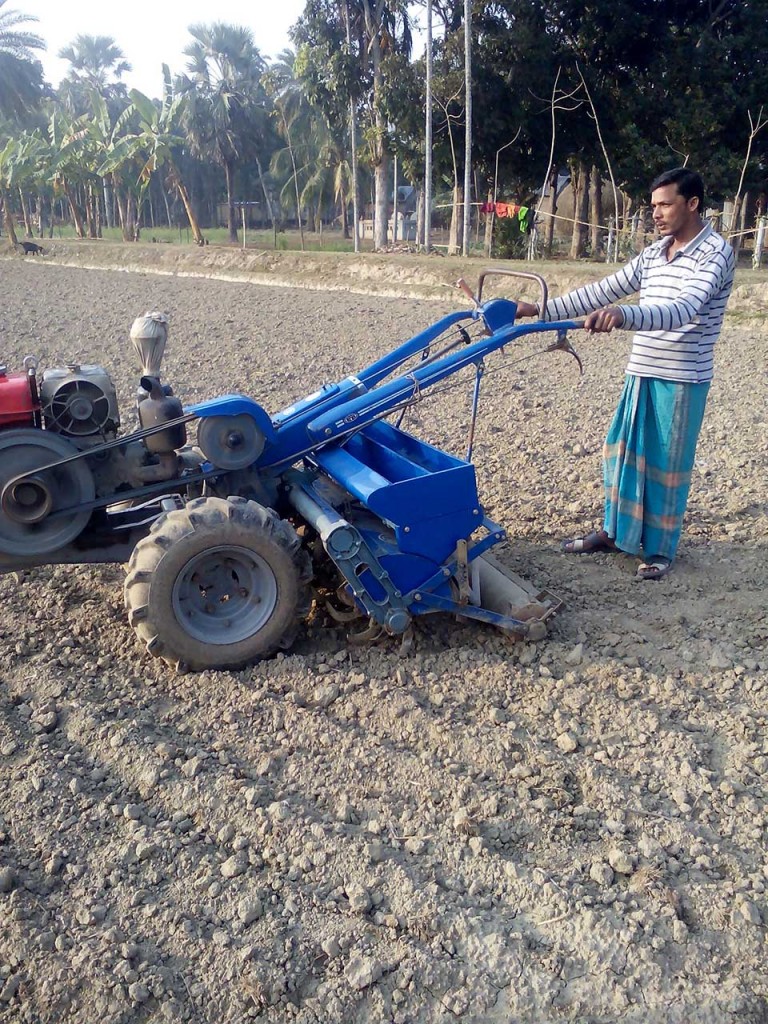Ensuring Access to Finance for Faster Technology Adoption in Northern Bangladesh
Cereal Systems Initiative for South Asia (CSISA) Phase III in Bangladesh, led by the International Maize and Wheat Improvement Center (CIMMYT) and implemented jointly with International Food Policy Research Institute (IFPRI) and International Rice Research Institute (IRRI), has finalized a series of joint venture agreements with Eco Social Development Organization (ESDO) and Thengamara Mohila Sabuj Sangha (TMSS), key microfinance institutions in northern Bangladesh. The partnerships will help ensure timely access to finance for local service providers in Thakurgaon and Dinajpur districts, and provide a much-needed ‘shot in the arm’ for adoption of scale-appropriate mechanization among smallholder farmers in the area.

A local service provider signs necessary documents for obtaining funds to buy an agricultural machine.
These recent agreements result from the groundwork already laid out by CSISA-Mechanization and Irrigation (CSISA-MI), a complementary investment to the larger, regional project that is funded by the U.S. Agency for International Development as part of Feed the Future – the U.S. Government’s initiative to address global hunger and food security. CSISA-MI’s overarching goal is to reach a tipping point – 15 percent of the total potential beneficiary base of local service providers and farmers in the Feed the Future zone – at which point a spontaneous private sector-led uptake is expected to take place.
CSISA-MI has been forging critical linkages in southern Bangladesh through, among others, public-private partnerships and by piloting self-sustaining business models. This approach follows an innovative private sector engagement model to create value chains that can and will continue to deploy equipment on a continued basis, ensuring long-term replication of the project’s scaling efforts.
Through joint venture agreements, CSISA-MI’s implementing partner iDE has so far established linkages with a number of established and emerging machinery manufacturers and importers, such as Advanced Chemical Industries, Rangpur Foundry Limited Group, and Janata Engineering. These enterprises and their service provider clients have invested their own funds towards the purchase, import, distribution, and marketing of equipment and use of machinery services – contributing an estimated value addition to the project of US$ 1.6 million.

A joint venture agreement is signed by Action in Development (AiD) and iDE.
As the spread of agricultural machines grows in Bangladesh, the need for access to affordable rural finance grows as well. This is an especially pertinent challenge for service providers, whose potential for increased earnings depends largely on their ability to purchase relevant agricultural machines. Therefore, CSISA Phase III is replicating the successful joint venture agreement model to forge partnerships with microfinance institutions that will help ensure that farmers in the North interested in purchasing relevant machinery can do so. Under this modality CSISA, through the microfinance institutions, has helped create a total credit availability of approximately US$ 90,000 for service providers to purchase machines.
CSISA Phase III has recently completed an orientation session for TMSS staff to iron-out the details of the joint venture agreement, to apprise them of technical issues commonly faced by service providers, and to familiarize them with technologies supported by the project. A similar exercise is planned for ESDO in the near future.
This article is authored by M. Shahidul Haque Khan, Communications Officer, CIMMYT-Bangladesh and Abir Ahmed Chowdhury, Officer-Communications, iDE.

 Owing to the timely support that CSISA-Mechanization and Irrigation (CSISA-MI) provided to dealers, power tiller operated seeder (PTOS) sales in Bangladesh have sharply increased. Between October and December 2015, 245 service providers bought the PTOS, more than the last two years’ sales combined. These newly purchased seeders alone accounted for approximately 1,500 hectares of land covered by service providers during the last boro (dry) season – an indication that farmers and service providers alike see value in the technology. The project also tracked other enterprises that contributed to another 660 seeders being sold, which accounted for an additional land coverage of approximately 4,200 hectares.
Owing to the timely support that CSISA-Mechanization and Irrigation (CSISA-MI) provided to dealers, power tiller operated seeder (PTOS) sales in Bangladesh have sharply increased. Between October and December 2015, 245 service providers bought the PTOS, more than the last two years’ sales combined. These newly purchased seeders alone accounted for approximately 1,500 hectares of land covered by service providers during the last boro (dry) season – an indication that farmers and service providers alike see value in the technology. The project also tracked other enterprises that contributed to another 660 seeders being sold, which accounted for an additional land coverage of approximately 4,200 hectares.